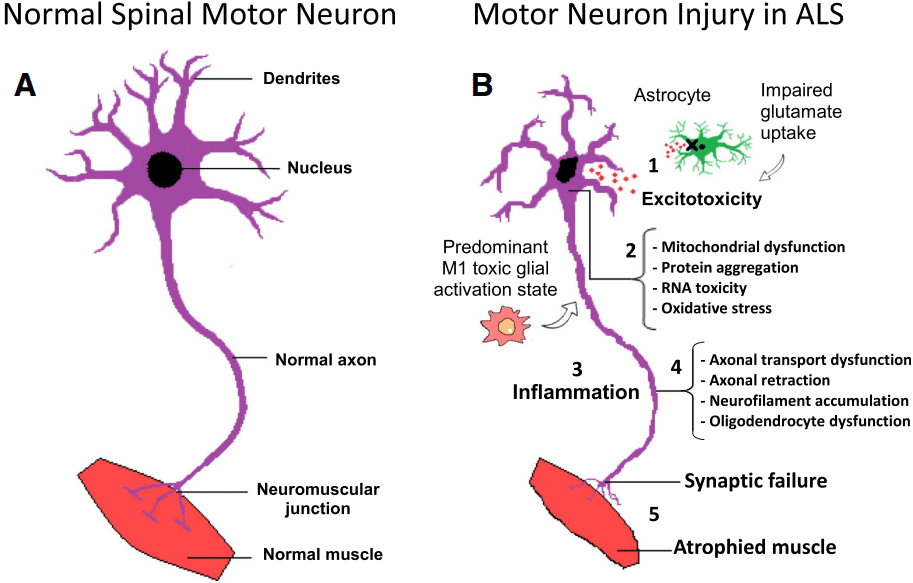NAA and Amyotrophic Lateral Sclerosis
Natural autoantibodies (NAAs) are autoreactive antibodies that are produced independently of the antigen and play an important role in stimulating the original innate system. The potential role of NAA biomarkers in amyotrophic lateral sclerosis (ALS) has attracted widespread interest in recent years. With an advanced high-resolution technology platform and an experienced team, Creative Biolabs focuses on providing cost-effective NAA services to global customers to help projects complete.
Introduction of ALS
ALS is a neurodegenerative disease primarily affecting the motor system, characterized by degeneration and axonal loss of upper motor neurons, the loss of upper and lower motor neurons in the brain leading to muscle weakness. ALS often has focal episodes that then spread to different parts of the body. The study found that in half of the cases, there were extra-motor manifestations, such as behavioral changes, executive dysfunction and language problems. Various results based on ALS biological studies have helped scientists gain insights into the pathogenesis of ALS. Thus, multiple ALS pathogenesis involving protein mutation, aggregation, and misfolding have been proposed. But the causes of ALS appear to be heterogeneous and only partially understood. It is worth noting that there is currently no cure or effective treatment for ALS, and multidisciplinary care, such as nutritional and respiratory support, remains the mainstay of treatment.
Pathology of ALS
Multiple molecular pathways have been hypothesized to be involved in the pathogenesis of ALS, such as failure of protein homeostasis, neuroinflammation, oligodendrocyte dysfunction, disturbances in RNA metabolism, cytoskeletal disturbances, defects in axonal transport and impaired DNA repair. Scientists have discovered that the pathological mechanism of ALS may be related to mutations in superoxide dismutase 1 (SOD1). Studies have found that SOD1 causes ALS through glutamate excitotoxicity, a process that involves activation of calcium-dependent enzymatic pathways, production of free radicals, and increased proinflammatory signaling. In addition, ALS sequencing has identified mutations in TANK1-binding kinase 1 (TBK1), which controls autophagy-related proteins and is associated with ALS. Therefore, autophagy is also believed to play a major role in ALS disease progression. Furthermore, histidine modifications, DNA methylation, RNA editing, chromatin remodeling, inflammation, and immune system factors have been implicated in the development of ALS.
 Fig.1 The mechanisms of pathology in ALS.1
Fig.1 The mechanisms of pathology in ALS.1
NAA in ALS
Scientists have found that NAA is beneficial for the repair of the nervous system. The experimental results demonstrate the potential therapeutic efficacy of NAA in devastating neurodegenerative CNS diseases, such as ALS and multiple sclerosis (MS). The discovery of this type of NAA provides a novel strategy to treat not only ALS but also a variety of diseases with axonal damage or loss.
NAA-related Services in Creative Biolabs
Our Advantages
- A wide variety of technology combinations ensure accurate results.
- Professional NAA technology platform
- Experienced research team
- Low cost, fast timeliness
- The best after-sales service
NAAs play an important role in the field of disease detection and prevention. After years of accumulation, Creative Biolabs has established an excellent team of scientists and an advanced technology platform dedicated to the discovery and detection of autoantibodies. With expertise and high technology, Creative Biolabs will be your best partner in NAA related services. Please feel free to contact us for more information.
Reference
- Ciervo, Yuri, et al. "Advances, challenges and future directions for stem cell therapy in amyotrophic lateral sclerosis." Molecular neurodegeneration 12 (2017): 1-22.
Related Services:
- NAA and Schizophrenia
- NAA and Alzheimer's Disease
- NAA and Lambert-Eaton Muscular Weakness Syndrome
- NAA and Epilepsy

